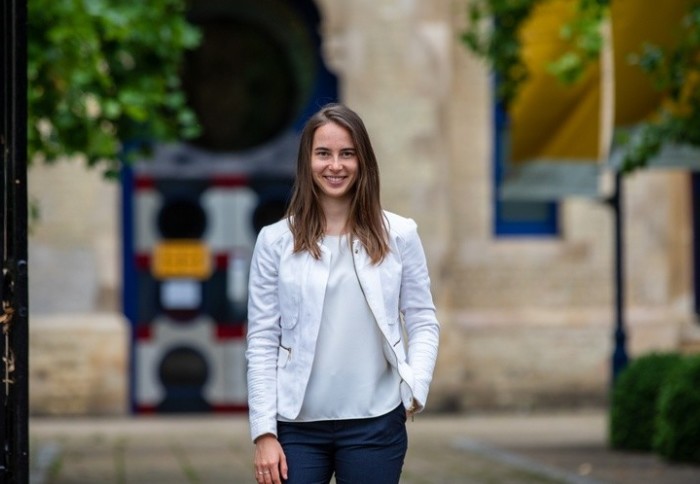Meet the Imperial women at the helm of game-changing new startups

Co-founder of Happyr Health, one of the finalists in this year's competition, Nicola Filzmoser
From preventing diabetic foot ulcers to a new braille device, Imperial women are at the forefront of developing innovative businesses.
Five new startups founded by women students are set to go head-to-head in the final stage of the College’s WE Innovate Programme.
The WE Innovate programme, run by Imperial’s Enterprise Lab, is the College’s flagship entrepreneurship education programme designed to support the next generation of women entrepreneurs and help them accelerate their startups. The six-month programme supports students, graduates and alumni who identify as women to develop an early-stage business idea and advance their leadership and entrepreneurial skills.
WE Innovate incorporates business coaching, masterclasses and networking, with the aim of increasing the number of women in leadership positions, running startups and raising funding. At the final, the five finalists will pitch in front of a virtual audience for a chance to win a share of a £30,000 prize fund, sponsored by bp.
- Register to attend the virtual WE Innovate Final on Friday 25 June to watch the finalist pitches and hear the winners announced. Attendees can also vote for their favourite semi-finalists in the People’s Vote.
Managing migraines
One in four children and young people worldwide experience chronic pain. Happyr Health, co-founded by MSc Healthcare & Design student Nicola Filzmoser, is a headache and migraine management app that uses storytelling and gaming to help manage chronic pain in children and young people. They follow daily missions of evidence-based exercises to increase mental health and disease resilience. The team match therapy missions with individual patient profiles using their artificial intelligence algorithm.
Helping visually impaired people access information
 Braille is essential for visually impaired people to access information. The team behind Paige say that modern braille technology is limited to single-line text, which makes simple reading tasks time-consuming and laborious for the blind, and certain fields, such as STEM subjects, very difficult to access. In addition, current devices are very expensive.
Braille is essential for visually impaired people to access information. The team behind Paige say that modern braille technology is limited to single-line text, which makes simple reading tasks time-consuming and laborious for the blind, and certain fields, such as STEM subjects, very difficult to access. In addition, current devices are very expensive.
The team’s solution incorporates multiple lines of braille, which is key for accessing mathematics and other scientific fields. Paige was co-founded by Carolina Gomes, third year Biomedical Engineering student.
Smart insoles to prevent diabetic foot ulcers
Neuropathy, damage to the nerves, is one of the long-term complications of diabetes and can lead to foot ulceration and even amputation. Early detection of neuropathy signs can prevent diabetic foot ulcers and improves patients’ quality of life. NEUROsole are smart insoles paired with an app that detect early signs of inflammation and poor circulation. The app then gives patients real-time advice upon changes in circulation.
NEUROsole also encourages patients to engage with regular and remote foot-care, guiding them through a foot-exam which they would otherwise only receive once a year. NEUROsole was founded by fourth year medical student Ambreen Muhammed.
Developing new diagnostic platforms
According to Zyme Biosciences, the COVID-19 pandemic has highlighted the need for cheap molecular diagnostic platforms. Currently expensive equipment and specialised personnel are required to measure the presence of RNA, DNA or other sequences in a sample - such as PCR testing, which must also be run at a controlled temperature.
The team is developing an all-inclusive kit that can be used at room temperature without the need for additional equipment. Zyme Biosciences was co-founded by Dr Marta Broto, Postdoctoral Research Associate, and Research Associate Dr Leah Frenette, both from the Department of Materials.
People supported intelligence
For effective public decision making, deliberation is needed, yet conducting public participation in local decision-making effectively is expensive. SURU Together have developed an audio platform, People Supported Intelligence (PSI) for decision making. Their platform would allow small group deliberation of a challenge, such as ‘How can we social distance while keeping high street shops open?’. This would allow civic organisations, such as local councils, to gain an insight into public sentiment.
SURU Together was co-founded by Georgie Denis who is studying for a Master of Public Health.
Article text (excluding photos or graphics) © Imperial College London.
Photos and graphics subject to third party copyright used with permission or © Imperial College London.
Reporter
Joanna Wilson
Communications Division